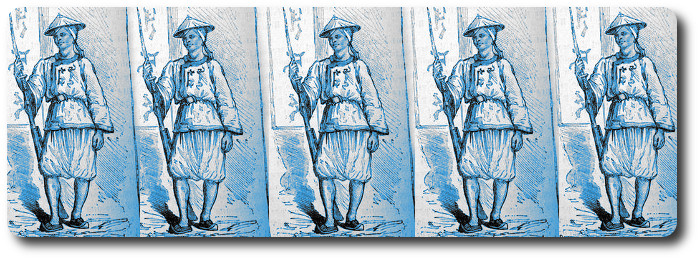Topic: Discipline

Soldiering in Annam (1883)
Composition of the Annamite Army and its Discipline
Montreal Daily Witness, 6 September 1883
The St. James Gazette gives an interesting description of the army at the disposal of the King of Annam. It is reckoned officially at 200,000 men. Of these 40,000 garrison the capital, and half that number is assigned to Hanoi and the surrounding fortresses Nam Dinh, Nihn Bihn, Bach Nihn, and other places in Tonquin. The rest are ordinarily disguised in civilian attire, and are not to be distinguished from harmless agriculturists. When a man is dressed in the customary vestments of a Madras coast coolie—a handkerchief and a bit of string—it is difficult at the first blush to determine his profession. In Annam, however, the matter is rendered comparatively simple. The law is, from every three men one recruit. Except, however, in cases of extraordinary public necessity this rule is not acted up to; one man from every seven or eight is much nearer the average. The selection of the recruits is left entirely to the local authorities, and the village mandarins make a good thing out of the annual levies.
The Drill
In default of squad drill the Annamese recruits are put through a variety of unpleasant experiences designed to test their courage. Physical courage and endurance are supposed to be the primary requisites of a soldier, and, after that, the knowledge of how to load and let off a gun. It is pleasantly assumed by the military officers that the men chosen for the army are the worst of the population. The madarins are supposed to keep their districts quiet by drafting all their mauvais sujets into the annual levy. There is, accordingly, the less compunction in putting them through the prescribed tests. The first of these is to assault the raw recruit violently with a sabre. The sabre is a wooden one, certainly; but the drill sergeant hits hard, and knows from personal experience where it hurts most. Operations commence on the back and end with blows on the head. The recruit who stands battering about the head for a matter of five minutes without uttering a groan or flinching, even involuntarily, is hailed as a finished soldier and excused further "drill." To shrink, or even to moan, when beaten on the head with the wooden sabre is considered pardonable, and the victim is noted down as an "ordinary" soldier, instead of an "able bodied" one.
Punishments
But the recruit who cries out when he is hit on the body or confesses by a wiggle that the exercise is painful is reported for punishment and then put through a new course of instruction. The punishment usually consists in a certain number of blows from a bamboo on the upper part of the thighs, so that, except for the dignity of the thing, there is a close resemblance between punishment and military discipline. The military mandarins defend the system on the ground that it is very ancient, and that it is unique in the military exercises of the world—the latter assertion being incontrovertible. Energetic officers of the army frequently invent fantastic tests of a similar character in addition to the regulation exercises. A story at Hue is related of a beau sabreur of the Tay-son rebellion who had a ditch dug and filled the bottom with swords and pikes stuck into the ground point upward. He then called upon his men to engage in drill. They were to fling themselves into the ditch. The most stoical of the "able bodied" shrunk from this novel addition to the manual of exercises. Only one man was found to do it. He went in with a rush, and the swords and pikes collapsed before him. They had been kept in position by the most slender of threads.

